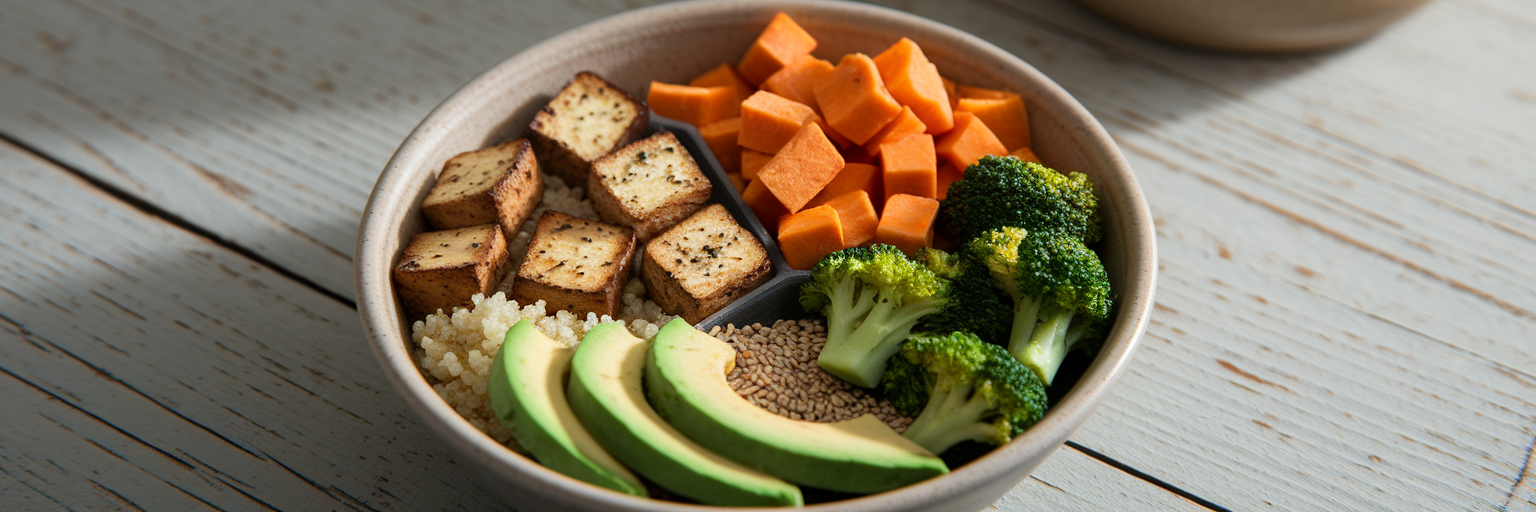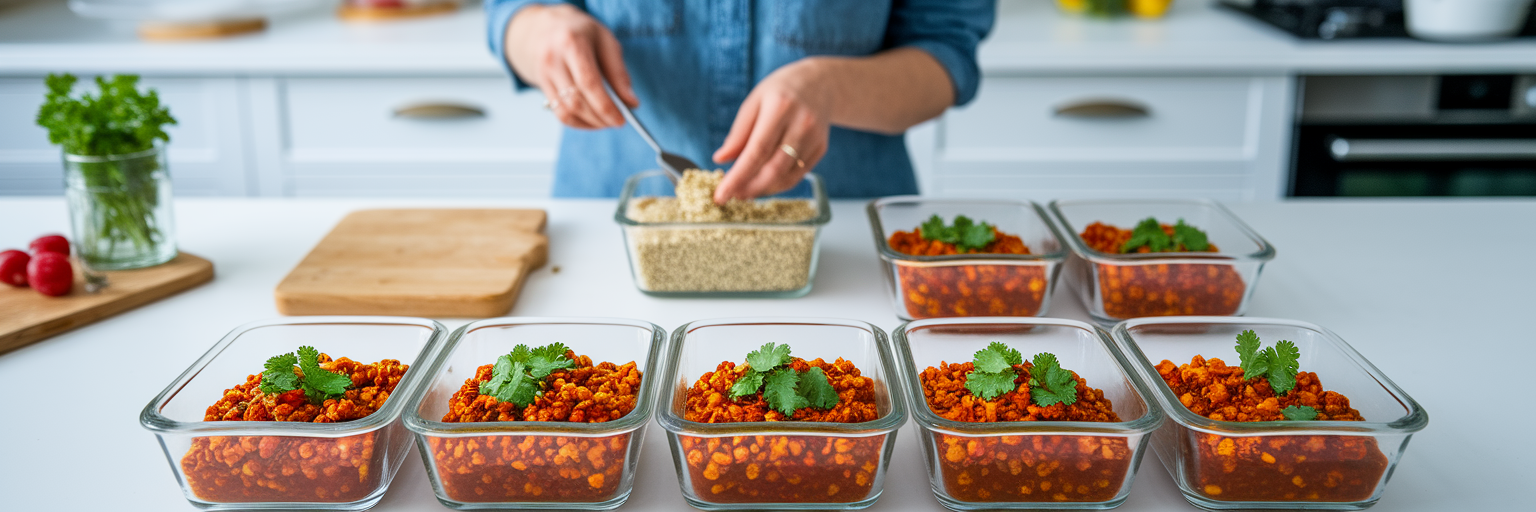Why Protein Is Your Best Friend for Fitness
Let's address the big question right away: "Can I really build muscle and recover effectively without meat?" The answer is a resounding yes. A well planned plant based diet can absolutely provide everything your body needs to get stronger and perform at its best.
Think of protein as your body's dedicated repair crew. After a workout, your muscles have tiny, microscopic tears. Protein provides the essential building blocks, called amino acids, that this crew uses to patch things up. This repair process is what makes your muscles grow back stronger. It’s the core of fitness progress.
This guide will show you exactly how to build delicious high protein vegan meals for optimal recovery. We’ll cover the best protein sources to keep in your pantry, how to balance your plate for performance, and share some quick recipes and meal prep tips to make it all incredibly simple.
The Powerhouse Plant Proteins to Stock Up On
Building a high protein vegan diet is all about variety. You may have heard about "complete" versus "incomplete" proteins. While it's true that some plant foods are lower in one or two essential amino acids, this is easily solved by eating a mix of different sources throughout the day. Your body is smart enough to pool these amino acids together. The key is to stock your kitchen with a few powerhouse ingredients.
Focusing on sources rich in the amino acid leucine is particularly helpful, as it acts like a switch that turns on your body's muscle repair system. Soybeans and lentils are fantastic choices for this. Here are some of the best plant protein sources to get you started.
Tofu and Tempeh: The Versatile Champions
Tofu and tempeh are soybean products that are true staples in a plant based kitchen. According to health resource Healthline, firm tofu packs around 22 grams of protein per half cup. It’s a blank canvas that soaks up marinades and spices beautifully. Tempeh, its fermented cousin, offers a firmer, nuttier texture and the added benefit of probiotics for gut health.
Lentils and Chickpeas: The Budget-Friendly Staples
Lentils and chickpeas are not only affordable but also incredibly nutritious. A cup of cooked lentils provides about 18 grams of protein along with a healthy dose of fiber, which aids digestion and keeps you feeling full. Chickpeas are just as versatile, perfect for making hummus, adding to salads, or stirring into curries. They are a cornerstone of any effective vegan muscle recovery food plan.
Soybeans (Edamame) and Quinoa: The Complete Powerhouses
Edamame, which are young soybeans, are a fantastic snack or meal addition, offering a complete protein profile. Quinoa is another standout. While technically a seed, it's prepared like a grain and is one of the few plant foods that contains all nine essential amino acids, making it a true complete protein. It’s a perfect base for any recovery bowl.
For more ideas on nutrition, feel free to explore the articles on our blog.
At-a-Glance Guide to Plant-Based Proteins
| Protein Source | Approx. Protein per Cooked Cup | Top Benefit |
|---|---|---|
| Lentils | 18g | High in fiber, iron, and budget-friendly. |
| Chickpeas | 15g | Versatile for salads, curries, and hummus. |
| Tofu (Firm) | 44g (per 1 cup) | Excellent texture absorption for marinades. |
| Tempeh | 34g | Fermented for gut health, great nutty flavor. |
| Quinoa | 8g | A complete protein with all nine essential amino acids. |
| Edamame (Shelled) | 22g | Great as a snack or addition to bowls. |
Balancing Your Plate for Peak Performance

While protein is essential, it doesn’t work alone. For optimal recovery, you need a balanced team of macronutrients. Think of it like building a house: protein provides the bricks to rebuild muscle tissue, but you also need carbohydrates for energy to power the construction crew, and healthy fats for the wiring and long term maintenance.
After a workout, your body's energy stores, known as glycogen, are depleted. Complex carbohydrates from sources like sweet potatoes, brown rice, and oats are crucial for refilling these stores, giving you the energy to recover and prepare for your next session. Don't skip the carbs; they are your primary fuel source.
Healthy fats from avocados, nuts, and seeds play a vital role too. They help reduce inflammation, support hormone function, and absorb certain vitamins. All of these functions are critical for a smooth and efficient recovery process.
A simple visual guide for your recovery plate is:
- Half your plate: Complex carbs and colorful vegetables.
- One quarter of your plate: A powerhouse plant protein.
- One quarter of your plate: A source of healthy fats.
Quick and Delicious Post-Workout Recipes
Let’s be honest, the last thing you want after a tough workout is a complicated recipe. You need something fast, easy, and packed with the nutrients your body is craving. These simple ideas for a plant based post workout meal are designed to be ready in minutes, so you can refuel without the fuss.
- Speedy Lentil & Spinach Curry: This one-pot wonder is a lifesaver. Simply sauté some garlic and onion, add red lentils, a can of coconut milk, and your favorite curry spices. Let it simmer for about 15-20 minutes until the lentils are soft, then wilt in a big handful of spinach at the end. It’s warm, comforting, and incredibly restorative.
- 15-Minute Tofu Scramble: A perfect post-workout breakfast or lunch. Crumble a block of firm tofu into a pan with a bit of oil. Add a pinch of turmeric for color, some nutritional yeast for a cheesy flavor, and a splash of soy sauce. Scramble for a few minutes until heated through and serve with a side of whole-wheat toast and avocado.
- Hearty Black Bean & Quinoa Bowl: This is more of an assembly job than a recipe. Take a base of pre-cooked quinoa and top it with a can of rinsed black beans, corn, chopped bell peppers, and a big scoop of salsa. For extra protein and healthy fats, add some pumpkin seeds or a drizzle of tahini dressing.
These meals prove that you don’t have to sacrifice flavor or time to get the recovery nutrition you need. For more detailed instructions, check out these easy vegan protein recipes you’ll actually crave.
Smart Meal Prepping for a Stronger Week

Consistency is what separates good results from great ones. The secret to staying on track with your nutrition isn't willpower; it's planning. An easy vegan meal prep routine removes the daily guesswork and ensures you always have a healthy, high-protein option ready to go. This isn't about spending your entire Sunday in the kitchen, but about a few smart steps that set you up for success.
- Batch Cook Your Staples: Dedicate an hour to cooking a large batch of a versatile grain like quinoa or brown rice. At the same time, you can roast some sweet potatoes or boil a pot of lentils. Store them in airtight containers in the fridge, and you have the base for countless meals all week long.
- Prepare Your Proteins: Make your protein sources convenient. Press and bake or air-fry a block of tofu or tempeh seasoned with your favorite spices. Once cooked, you can slice it up and add it to salads, bowls, or wraps throughout the week.
- Create 'Grab-and-Go' Jars: Layering is the key to a fresh, non-soggy salad jar. Start with the dressing on the bottom, followed by hard veggies like carrots and chickpeas, then your grains, and finally leafy greens on top. Just shake it up when you're ready to eat.
A little preparation goes a long way in making your fitness journey smoother and more enjoyable.
Innovations in Plant-Based Sports Nutrition
While a whole-foods diet is the foundation of great health, modern plant-based supplements offer incredible convenience for athletes. The options today go far beyond simple soy protein. Innovations have led to sophisticated blends that are specifically designed for performance and recovery.
Many high-quality vegan protein powders now combine sources like pea and brown rice protein. This isn't random; it's done to create a complete amino acid profile that provides all the building blocks your muscles need, much like traditional whey protein. This makes them an excellent tool for that critical post-workout window when you might not have time for a full meal.
It's important to view these supplements as a helpful tool, not a replacement for a balanced diet. They are there to fill the gaps and make your life easier. A scoop of protein in a shaker bottle with some plant-based milk is a perfect, quick solution to kickstart recovery. For a clean and delicious option, you can try our chocolate vegan protein, which is formulated for exactly this purpose.
Your Vegan Recovery Blueprint
Building muscle and recovering strong on a vegan diet is not only possible, it's straightforward when you have the right strategy. You don't need complicated plans, just a focus on a few key principles. Let's recap your blueprint for success:
- Eat a Variety of Proteins: Mix and match lentils, beans, tofu, tempeh, and quinoa to ensure you get all your essential amino acids.
- Balance Your Plate: Remember the formula of protein, complex carbs, and healthy fats to cover all your recovery needs.
- Plan Ahead: A little meal prep makes consistency feel effortless.
One final tip: try to spread your protein intake throughout the day rather than having it all in one meal. This gives your body a steady supply of amino acids for ongoing repair. With these simple steps, you have everything you need to thrive.
What are your favorite high-protein vegan meals? Share them in the comments below! And if you found this guide helpful, please share it with a friend. Ready to stock up? You can browse our full collection of products to support your fitness journey.



